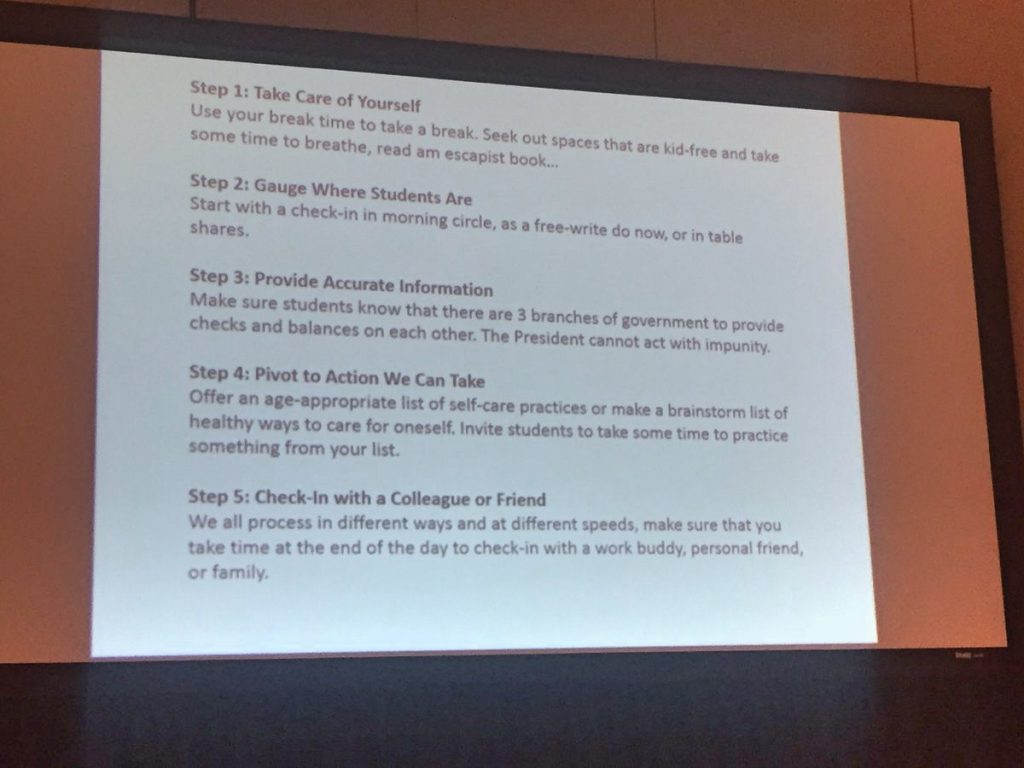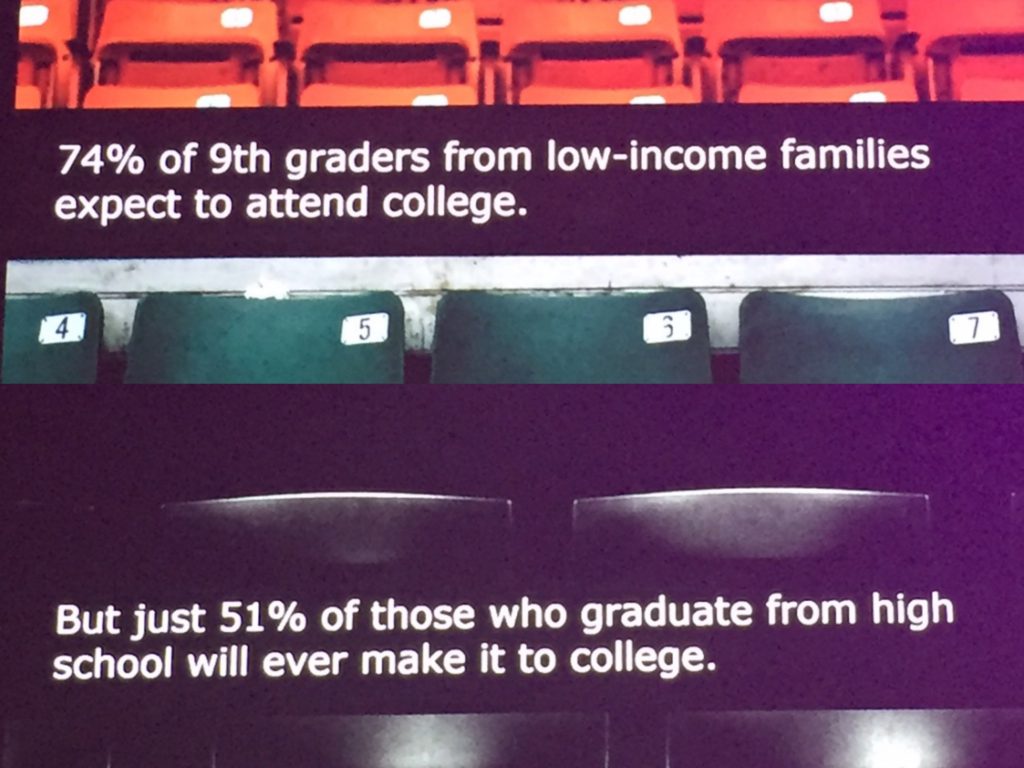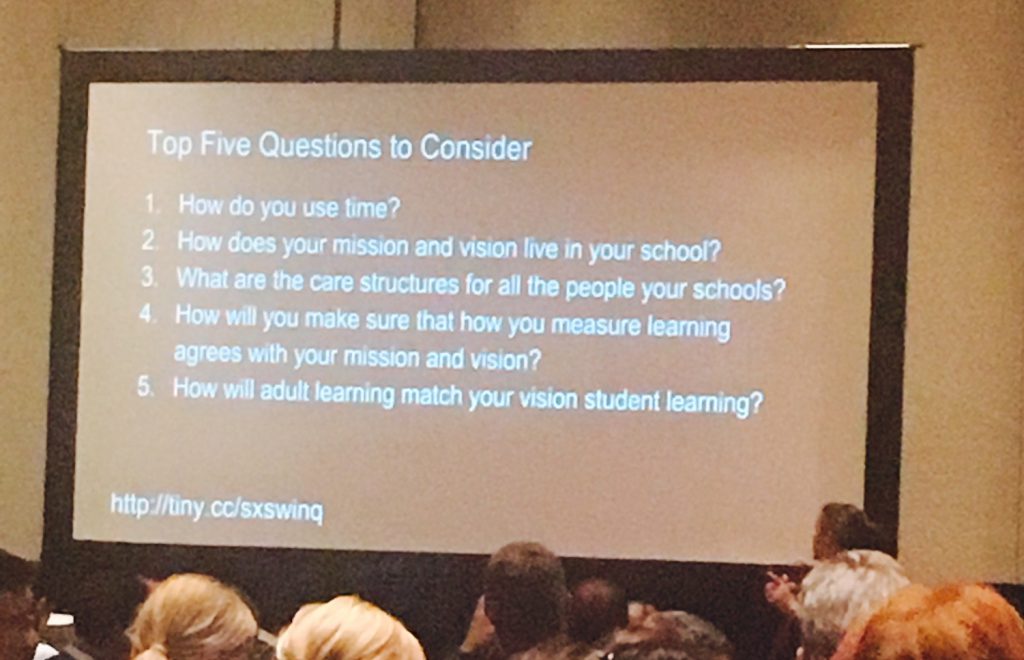Last week, some of us from the Students at the Center team traveled to SXSWedu, an annual conference that draws thousands from the education and technology fields to discuss education challenges and solutions. Three keynotes and over 20 sessions later, we heard speakers and panelists –educators and education professionals, entrepreneurs, students, and policymakers –bring the four principles in our Students at the Center Framework to life. We also noted that this year’s conference surfaced themes of equity, social-emotional learning, and creativity–topics we find timely and incredibly important in the educational landscape.
We’re still absorbing and synthesizing everything we learned and are planning to develop deeper, more nuanced action steps inspired by the themes and takeaways. However, we got our hands on so many useful and practical resources that we could not wait to share with others who might find them valuable. They include slide decks from presentations and other relevant blogs, websites and tools to get you thinking about the conference themes, innovations in the field, student-centered instructional strategies, new approaches to professional development, and, of course, supporting deeper learning outcomes for students.
Equity
- Christopher Emdin gave a must-see opening keynote on equity. His book, For White Folks Who Teach in the Hood… and the Rest of Y’all Too: Reality Pedagogy and Urban Education, is a great read for every stakeholder involved in urban education
- Looking for resources to help encourage your colleagues to learn about social justice issues? Check out this blog shared by Teaching Tolerance, from the “Talking the Talk: Anti-bias & Other Hard Topics” session.
- Boston’s Codman Academy shared their five-step guide to talking about tough racial and political issues as they happen.
- Step 1: Take Care of Yourself
- Step 2: Gauge Where Students are
- Step 3: Provide Accurate Information
- Step 4: Pivot to Action We Can Take
- Step 5: Check-in with a Colleague or Friend
- Restoring the Peace, a website started by one of the panelists of “How Restorative Justice Can Impact Your Community”, has information about restorative justice practices. Signing up for their #BeTheChange tools allows free access to resources and videos about how to adopt restorative justice practices.
- Sarah Goldrick-Rab delivered an informative keynote address about the true price of college, including illuminating statistics and data analyses highlighting that hard work does not always equate to college completion or even attendance.

Curriculum, Instruction or Lesson Design and Edtech
- This slide deck from the “Creating with Constraints” session has tangible and useful brainstorming guides for developing an innovative and transformational learning experience that takes into account any constraints that a school leader or educator might have.
- One of the panelists shared this blog about design thinking.
- This slide deck from the “Computational Thinking Makes Better Learners” session has information and infographics on the concepts behind computational thinking, how you can assess computational thinking concepts and approaches, as well as additional resources and an opportunity to add questions and feedback to a collaborative document.
- Our Programming for Personalization e-book provides a set of resources and strategies to help educators build digital literacy and computational thinking competencies across disciplines.
- Julia Freeland Fisher and Lisa Hansel battled it out (sort of) debating the concepts of “personalization” during the “Good, Bad & Ugly: Blended Learning Effectiveness” They also shared these resources:
- BlendedLearning.org, which includes information on blended learning, blended schools and how to build a blended learning program.
- LearningAccelarator.org, includes measurement tools for blended learning and personalization.
- Dan Willingham’s book Why Don’t Students Like School?: A Cognitive Scientist Answers Questions About How the Mind Works and What It Means for the Classroom, is a research backed analysis of why and how learning happens.
Future of School: EdTech and Innovation Practices
- The “Will VR Really Impact Student Outcomes?” session shared a Padlet, which includes links to classroom resources, tweets from the panelists, and ideas for various AR/VR tech tools and lesson creation.
- Our Students at the Center paper, The Role of Digital Technologies in Deeper Learning, explores how partnering deeper learning strategies with effective technology designs allows for greater educational success.
- “The Network Effect: Robust Learning Pathways for All” session, shared the impact of Remake Learning Network–education innovation clusters. The website includes blogs and other resources about this initiative. The presenters also shared these resources:
- Learn more about Remake Learning Bay Area, and their prototype collaboration with MLK Middle School to connect the students and educators with STEAM professionals designing real-world learning experiences.
- Check out the Kentucky Valley Educational Cooperative, a social learning network.
- Community Share, out of Tuscon, AZ, provides opportunities for students to meet, interact and collaborate with experts in different occupations
Professional Development
- We shared Jobs for the Future and CCSSO’s Educator Competencies, during the hands-on session Teachers Are Learners, Too: Next Gen Learning & PD, co-led by our colleague Rebecca E. Wolfe.
- What are micro-credentials?, information about the credentialing system developed by Digital Promise, seen as a viable shift for teacher assessment and an innovative way to help teachers learn and become proficient in relevant skills.
School Design
- This slide deck and collaborative notes from “Building an Inquiry-Based School Model” session, includes questions to consider when thinking about inquiry-based models, as well as additional resources and school examples.
Did you attend SXSWedu and have any additional resources to share? Tweet them to us!


